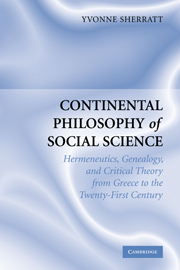Book contents
- Frontmatter
- Contents
- Preface
- Continental Philosophy of Social Science
- Introduction
- PART I THE TRADITION OF HERMENEUTICS
- PART II THE TRADITION OF GENEALOGY
- Introduction
- 6 The History of Genealogy: Nietzsche
- 7 Theory of Genealogy: Foucault
- 8 Applications of Genealogy
- PART III CRITICAL THEORY
- Conclusion
- Bibliography
- Index
6 - The History of Genealogy: Nietzsche
Published online by Cambridge University Press: 23 November 2009
- Frontmatter
- Contents
- Preface
- Continental Philosophy of Social Science
- Introduction
- PART I THE TRADITION OF HERMENEUTICS
- PART II THE TRADITION OF GENEALOGY
- Introduction
- 6 The History of Genealogy: Nietzsche
- 7 Theory of Genealogy: Foucault
- 8 Applications of Genealogy
- PART III CRITICAL THEORY
- Conclusion
- Bibliography
- Index
Summary
We begin with an introduction to the history of the ‘tradition’ of genealogy and discuss this approach as first articulated by Friedrich Nietzsche. We introduce the life and works of this infamous German philosopher and take a brief look at his early works and his views about knowledge. We then depict genealogy as an approach to the humanities used to critically analyse Christianity. We see how it was developed by the influential post-structuralist thinkers in the social sciences, in particular Foucault, whom we focus upon in the later chapters of this section.
NIETZSCHE
Friedrich Wilhelm Nietzsche was born in Germany in 1844. He lived until 1900, although he spent his latter years in a condition of complete insanity. He was a highly successful classicist, awarded a Chair in Classics at the University of Basle in 1869 at the startlingly young age of twenty-five. He then proceeded to write a succession of immensely influential books from the 1870s onwards. The style of all these works is similar, namely, poetic, aphoristic, highly expressive and emotionally charged. It was in 1889 that Nietzsche became plagued by insanity which lasted for eleven years until his death at the turn of the century. Tragically, he was not recognised during his sane life and then was only later perceived to be one of the most important European thinkers ever. Infamously, the Nazis made fallacious use of his philosophy decades after his death.
- Type
- Chapter
- Information
- Continental Philosophy of Social Science , pp. 121 - 142Publisher: Cambridge University PressPrint publication year: 2005



